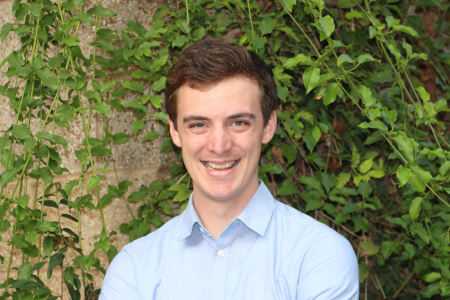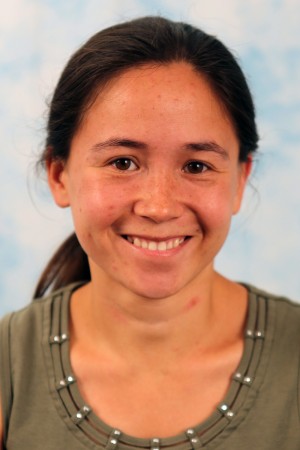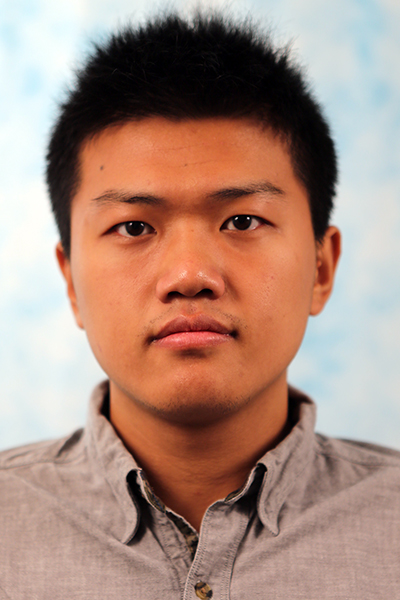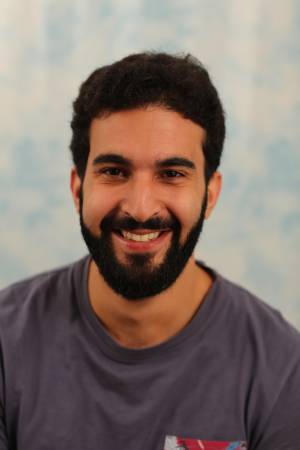Carnegie Mellon University
MSR Thesis Talk: Haidar Jamal
Title: Localization for Lunar Micro-Rovers Abstract: This talk presents an avionics and localization system that enables a lunar micro-rover to navigate autonomously. This system is important for the latest class of small, low-powered, and fast robots going to the Moon in search of polar ice. The first component of the system is an Extended [...]
PoseIt: A Visual-Tactile Dataset of Holding Poses for Grasp Stability Analysis
Abstract: When humans grasp objects in the real world, we often move our arm to hold the object in a different pose where we can use it. In contrast, typical lab settings only study the stability of the grasp immediately after lifting, without any subsequent re-positioning of the arm. However, an object’s stability could vary [...]
Planning to Minimize Human and Robot Efforts Over Tasks
Abstract: It is not feasible to pre-program robots a priori for every possible task they may encounter in unstructured domains. Upon encountering a task that a robot can't solve, one common strategy is to teach it new skills via demonstrations. However, demonstrating a task can often be more cumbersome than performing the task directly. This [...]
MSR Thesis Talk: Akash Sharma
Title: Incorporating Semantic Structure in SLAM Abstract: For robots to understand the environment they interact with, a combination of geometric information and semantic information is imperative. In this talk, I propose a fast and scalable Simultaneous Localization and Mapping (SLAM) system that represents indoor scenes as a graph of semantic objects. Leveraging the observation that [...]
Propelling Robot Manipulation of Unknown Objects using Learned Object Centric Models
Abstract: There is a growing interest in using data-driven methods to scale up manipulation capabilities of robots for handling a large variety of objects. Many of these methods are oblivious to the notion of objects and they learn monolithic policies from the whole scene in image space. As a result, they don’t generalize well to [...]
Carnegie Mellon University
Yaadhav Raaj MSR Thesis Talk
Title: Exploiting Uncertainty in Triangulation Light Curtains for Object Tracking and Depth Estimation Abstract: Active sensing through the use of Adaptive Depth Sensors is a nascent field, with potential in areas such as Advanced driver-assistance systems (ADAS). One such class of sensor is the Triangulation Light Curtain, which was developed in the Illumination and Imaging [...]
Carnegie Mellon University
Active Vision: Autonomous Aerial Cinematography with Learned Artistic Decision-Making
Abstract: Aerial cinematography is revolutionizing industries that require live and dynamic camera viewpoints such as entertainment, sports, and security. Fundamentally, it is a tool with immense potential to improve human creativity, expressiveness, and sharing of experiences. However, safely piloting a drone while filming a moving target in the presence of obstacles is immensely taxing, often [...]
Fine-Tuning Offline Reinforcement Learning with Model-Based Policy Optimization
Abstract: In offline reinforcement learning (RL), we attempt to learn a control policy from a fixed dataset of environment interactions. This setting has the potential benefit of allowing us to learn effective policies without needing to collect additional interactive data, which can be expensive or dangerous in real-world systems. However, traditional off-policy RL methods tend [...]
MSR Thesis Talk: Zhipeng Bao
Title: Introducing Generative Models to Facilitate Multi-Task Visual Learning Abstract: Motivated by multi-task learning of shared feature representations, this talk considers a novel problem of learning a shared generative model that can facilitate multi-task learning. We present two systems to utilize generative modeling for other visual tasks. The first system focuses on learning a generative [...]
Carnegie Mellon University
MSR Thesis Talk: Shanshan Jessy Xie
Title: GPU based perception via search for object pose estimation with RGB data Abstract: Known object pose estimation is essential for a robot to interact with the real world. It is the first and fundamental task if the robot wants to manipulate the object. This problem is particularly challenging when the environment is complicated [...]
Carnegie Mellon University
Accelerating Numerical Methods for Optimal Control
Abstract: Many modern control methods, such as model-predictive control, rely heavily on solving optimization problems in real time. In particular, the ability to efficiently solve optimal control problems has enabled many of the recent breakthroughs in achieving highly dynamic behaviors for complex robotic systems. The high computational requirements of these algorithms demand novel algorithms tailor-suited [...]
Modeling Coupled Human-Robot Motion for Provable Safety
Abstract: Guide robots that help users who are blind or low vision navigate through crowds and complex environments show promise for improving accessibility in public spaces. These robots must provide real-time safety guarantees for the users, which requires accurate modeling of their behavior in the context of closely coupled human-robot motion. This model must also [...]
MSR Thesis Talk – Mosam Dabhi
Title: Multi-view NRSfM: Affordable setup for high-fidelity 3D reconstruction Abstract: Triangulating a point in 3D space should only require two corresponding camera projections. However in practice, expensive multi-view setups -- involving tens sometimes hundreds of cameras -- are required to obtain the high fidelity 3D reconstructions necessary for many modern applications. In this talk, we argue [...]
Carnegie Mellon University
Robust Object Representations for Robot Manipulation
Abstract: As robots become more common in our daily lives, they will need to interact with many different environments and countless types of objects. While we, as humans, can easily understand an object after seeing it only once, this task is not trivial for robots. Researchers have, for the most part, been left with two [...]
Diminished Reality for Close Quarters Robotic Telemanipulation
Abstract: In robot telemanipulation tasks, the robot itself can sometimes occlude a target object from the user's view. We investigate the potential of diminished reality to address this problem. Our method uses an optical see-through head-mounted display to create a diminished reality illusion that the robot is transparent, allowing users to see occluded areas behind [...]
Carnegie Mellon University
Visual Representation and Recognition without Human Supervision
Abstract: Visual recognition models have seen great advancements by relying on large-scale, carefully curated datasets with human annotations. Most computer vision models leverage human supervision to either construct strong initial representations (e.g. using the ImageNet dataset) or for modeling the visual concepts relevant for downstream tasks (e.g. MS-COCO for object detection). In this thesis, we [...]
Learning Compositional Radiance Fields of Dynamic Human Heads
Meeting ID: 942 4671 0665 Passcode: jkhzoom Abstract: Photorealistic rendering of dynamic humans is an important capability for telepresence systems. Recently, neural rendering methods have been developed to create high-fidelity models of humans and objects. Some of these methods do not produce results with high-enough fidelity for driveable human models (Neural Volumes) whereas others have [...]
When and Why Does Contrastive Learning Work?
Abstract: Contrastive learning organizes data by pulling together related items and pushing apart everything else. These methods have become very popular but it's still not entirely clear when and why they work. I will share two ideas from our recent work. First, I will argue that contrastive learning is really about learning to forget. Different [...]
Carnegie Mellon University
Heuristic Search Based Planning by Minimizing Anticipated Search Efforts
Abstract: Robot planning problems in dynamic environments, such as navigation among pedestrians, driving at high-speed on densely populated roads, and manipulation for collaborative tasks alongside humans, necessitate efficient planning. Bounded-suboptimal heuristic search algorithms are a popular alternative to optimal heuristic search algorithms that compromise solution quality for computation speed. Specifically, these searches aim to find [...]
Carnegie Mellon University
Liquid Metal Actuators
Abstract: Bioinspired robotic actuators arise from the advances in soft materials and activation methods to achieve desired performance. Because of their intrinsic compliance, actuators built from soft materials and liquids can achieve elastic resilience and adaptability similar to their biological counterparts. Liquid metals provide great opportunities for creating an artificial muscle that generates forces at [...]
Anticipating the Future: forecasting the dynamics in multiple levels of abstraction
Abstract: A key navigational capability for autonomous agents is to predict the future locations, actions, and behaviors of other agents in the environment. This is particularly crucial for safety in the realm of autonomous vehicles and robots. However, many current approaches to navigation and control assume perfect perception and knowledge of the environment, even though [...]
Carnegie Mellon University
Understanding and Mitigating Biases in Evaluation
Abstract: There are many problems in real life that involve collecting and aggregating evaluation from people, such as hiring, peer grading and conference peer review. In this thesis, we focus on three sources of biases that arise in such problems, and propose methods to mitigate them. First, we study human bias, that is, the bias [...]
Carnegie Mellon University
MSR Thesis Talk: Manan Shah
ZOOM Link: https://www.google.com/url?q=https://cmu.zoom.us/j/93845075967?pwd%3DbndGc3NvaUVDVFFTTDZvektrNWJqdz09&sa=D&source=calendar&ust=1623592142330000&usg=AOvVaw1xfNPT5c59CQGKzR2bw5sO ID: 93845075967 Passcode: 159459 Title: 3D SLAM for Powered Lower Limb Prosthesis Abstract: During locomotion, humans use visual feedback to adjust their leg movement when navigating the environment. This natural behavior is lost, however, for lower-limb amputees, as current control strategies of prosthetic legs do not typically consider environment perception. With [...]
Carnegie Mellon University
MSR Thesis Talk: Dennis Melamed
Title: Learnable Spatio-Temporal Map Embeddings for Deep Inertial Localization Abstract: Pedestrian localization systems often fuse inertial odometry with map information via hand-defined methods to reduce odometry drift, but such methods are sensitive to noise and struggle to generalize across odometry sources. To address the robustness problem in map utilization, we propose a system that forms a [...]
Learning to Perceive Videos for Embodiment
Abstract: Video understanding has achieved tremendous success in computer vision tasks, such as action recognition, visual tracking, and visual representation learning. Recently, this success has gradually been converted into facilitating robots and embodied agents to interact with the environments. In this talk, I am going to introduce our recent efforts on extracting self-supervisory signals and [...]
Carnegie Mellon University
Self-Learning of Structured Visual Representations
Abstract: Most computer vision models in deployment today are not learning. Instead, they are in a "test" mode, where they will behave the same way perpetually, until they are replaced by newer models. This is a problem, because it means the models may perform poorly as soon as their "test" environment becomes different from their [...]
Carnegie Mellon University
Resource-Constrained Learning and Inference for Visual Perception
Abstract: Real-world applications usually require computer vision algorithms to meet certain resource constraints. In this talk, I will present evaluation methods and principled solutions for both training and testing. First, I will talk about a formal setting for studying training under the non-asymptotic, resource-constrained regime, i.e., budgeted training. We analyze the following problem: "given a [...]
Carnegie Mellon University
Towards Safe and Resilient Autonomy in Multi-Robot Systems
Abstract: Autonomous systems such as robotic systems are envisioned to co-exist with humans in our daily lives, from household service to large-scale warehouse logistics, agricultural monitoring, and smart city. Reliable interactions among robots and humans require provably correct guarantees about safety and performance when designing robot behaviors. While traditional approaches for safety and performance analysis [...]
Carnegie Mellon University
Provably Constant-Time Motion Planning
Abstract: In many robotic applications, including logistics and manufacturing, robots often operate in semi-structured environments and perform highly repetitive manipulation tasks. Additionally, large parts of these environments are static most of the time. Fast and reliable motion planning is one of the key elements that ensure efficient operations in such environments. A very common example [...]
MSR Thesis Talk: Kshitij Goel
Title: Rapid Subsurface Exploration with Multiple Aerial Robots Abstract: This thesis develops a robotic exploration framework that allows for rapid and communication-efficient mapping of unknown environments with a team of aerial robots. Aerial robots can provide rapid and agile mobility in diverse environments where ground mobility is either severely constrained or impossible. However, high-speed flight [...]
Carnegie Mellon University
MSR Thesis Talk: Albert Ye
Title: BusEdge: Efficient Live Video Analytics for Transit Buses via Edge Computing Abstract: Many vehicles like transit buses are now routinely fitted with cameras. These live visual data are invaluable to achieve real-time traffic monitoring, but it is intractable to handle such a gigantic amount of data either locally or in the cloud due to [...]
Carnegie Mellon University
Planning to Optimize and Learn Reward in Navigation Tasks in Structured Environments with Time Constraints
Abstract: Planning problems in which an agent must perform tasks for reward by navigating its environment while constrained by time and location have a wide variety of applications in robotics. Many real-world environments in which such planning problems apply, such as office buildings or city streets, are very structured. They consist of passages with notable [...]
Carnegie Mellon University
MSR Thesis Talk: Yunze Man
Title: Multi-Echo 3D Object Detection Abstract: LiDAR sensors can be used to obtain a wide range of measurement signals other than a simple 3D point cloud, and those signals can be leveraged to improve perception tasks like 3D object detection. A single laser pulse can be partially reflected by multiple objects along its path, resulting [...]
Carnegie Mellon University
Krishna Uppala – MSR Thesis Talk
Title: Exemplar free video retrieval. Abstract: Video retrieval of activities has a wide range of applications. In the traditional mode of operation, a collection of example videos describing the activities are given and the retrieval technique identifies other samples in a dataset that semantically match the examples provided. However, retrieval using a collection of example [...]
Ruixuan Liu – MSR Thesis Talk
Title: Data-efficient Behavior Prediction for Safe Human-Robot Collaboration. Abstract: Predicting human behavior is critical to facilitate safe and efficient human-robot collaboration (HRC). However, human behavior is difficult to predict due to the scarcity of human motion data. This work explores using online adaptation, an online approach, and data augmentation, an offline approach, to deal with the [...]
MSR Thesis Talk: Vidhi Jain
Title: Explainability in navigation policies Abstract: Today's autonomous agents have improved performance with learning and planning algorithms, but the applicability of such agents in the human-inhabited world is confined. Humans find it hard to explain the model's decision-making and thus, may not trust it as a teammate. While working with a machine learning model that [...]
Carnegie Mellon University
MSR Thesis Talk: Aditya Sripada
Title: Turning Behavior of Running Systems induced by Leg Placement Abstract: Compared to legged robots, animals and humans can perform much faster and larger turns, even when they run at high speeds. Such rapid turns require the body of a runner to reorient dynamically and in synchrony with its redirection during stance. While it is [...]
Carnegie Mellon University
MSR Thesis Talk: Rohit Jena
Title: Learning Mental Models of Experts in a Simulated Search and Rescue Scenario Abstract: Search and Rescue is a task where the rescuers need to be cognitively agile, strategically consistent, and efficient to save as many trapped victims as possible. In a team scenario, the rescuers must additionally coordinate with each other based on [...]
MSR Thesis Talk: Mohamad Qadri
Title: Robotic Vision for 3D Modeling and Sizing in Agriculture Abstract: Obtaining accurate perceptual information is a critical component in agricultural robotics since there is a heavy need for interaction with the environment to perform tasks such as pruning, harvesting, and phenotyping. In this thesis, we tackle the problem of perception and 3D modeling in [...]
Carnegie Mellon University
MSR Thesis Talk: Alex Baikovitz
Title: Underground Representations for Robot Localization and Mapping Abstract: There has been exciting recent progress in using radar as a sensor for robot navigation given its increased robustness to varying environmental conditions. However, within these different radar perception systems, ground penetrating radar (GPR) remains under-explored. By measuring structures beneath the ground, GPR can provide stable features that [...]
Carnegie Mellon University
MSR Thesis Talk: Ankur Deka
Title: On combining Reinforcement Learning & Adversarial Training Abstract: Reinforcement Learning (RL) allows us to train an agent to excel at a given sequential decision-making task by optimizing for a reward signal. Adversarial training involves a joint optimization scheme where an agent and an adversary compete against each other. In this work, we explore some [...]
MSR Thesis Talk: Zhengyi Luo
Title: Physics-based object-aware ego-centric human pose estimation Abstract: We investigate the roles of body kinematics, dynamics, and objects for 3D human pose estimation using a head-mounted camera. Human kinematics models play a key role in encoding the natural range of human motion, while dynamics models can react to the spatial arrangement between humans and objects [...]


























